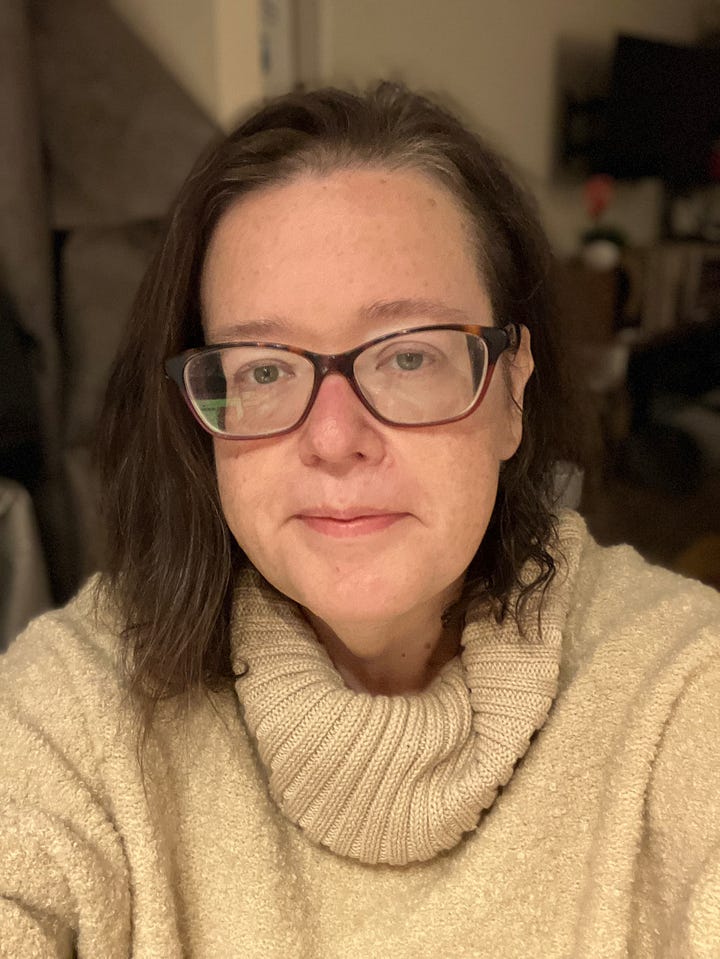GLP-1s, body image, and the truth I had to face
There’s more to health than weight loss. And more to respect than just acceptance.

This isn’t a post about rules. It’s about what I’ve lived, and what I’ve learned the hard way. As someone who’s lost weight, healed metabolically, and learned to question the stories we’re told about bodies, medications, and what health really means.
When I didn’t feel connected to my body
Looking back at photos from summer 2023 and then fall 2024, it was jarring. The inflammation was visible in my face. I never really felt connected to my body. Food was my comfort, for good moments and hard ones. And now? Taking up less space is still an adjustment. Sometimes I look in the mirror and still don’t quite recognize myself.
I’ve lost over 100 pounds and have reversed my Type-2 Diabetes. But the journey isn’t just physical. I had to get honest about how I was using food. I had to learn what real care looks like.


Body positivity and health aren’t mutually exclusive
I believe in kindness. I believe everyone deserves love and respect, at any size. But that doesn’t cancel out my individual responsibility to care for my body. When I weighed 100 pounds more than I do now, I wasn’t healthy. I’m in my early 50s. Having over 50% body fat at that age is not benign.
There were times when I felt awkward about “loving my body” while knowing it wasn’t healthy. And that dissonance wore me down. So instead of striving for self-love, I started with self-respect.
Why I stopped taking Mounjaro
I was prescribed Mounjaro Fall 2023. I took it for about six months. And while I’m grateful I was able to see for myself how a GLP-1 can be used, I chose to stop taking it. I continued losing weight, body fat, and visceral fat ever since. Without the drug.
That’s what worries me about the messaging around GLP-1s. I was told by my endocrinologist that I’d probably need to stay on it forever to maintain results. That wasn’t true for me. And I don’t believe I’m some rare exception. I do not have a superpower. I’m someone who decided to try a different path and discovered that sustainable, medication-free weight loss is possible: with the right tools, mindset, and support.
A GLP-1 is not the only option
I absolutely believe people deserve access to them at reasonable costs if that’s the route they choose. But it bothers me when we are told it’s the only option. Or that weight loss alone is the marker of success.
Body size is just the side effect. What matters more to me now: insulin resistance, body fat percentage, visceral fat, metabolic health, mood, and mindset.
I don’t believe in willpower
I used to think something was wrong with me because I couldn’t stick to a diet. I now see that willpower is unreliable. What works better for me is consistent persistence. I know my numbers. I track my A1C, my muscle mass, my blood glucose, and more. I know what I’m working toward, and I try to keep that top of mind when I feel tempted to turn to food for comfort.
If I feel like going off-plan, I try to play the tape forward. Do I want to feel comforted for five minutes and then end up feeling physically and emotionally terrible for hours or even days later? Usually, the answer is no.
Why education matters
I didn’t even know what insulin resistance was until I joined The Fasting Method’s online community in spring 2024. No doctor had ever brought it up, even with a Type-2 Diabetes diagnosis going back to 2007 and an A1C as high as 13.3%. When I finally asked to get my insulin tested, I had to advocate hard just to get it approved.
I’d love to work with a functional health provider, but that’s not currently in reach financially. So I’ve read a lot of books, listened to tons of podcasts, and leaned into support communities that actually talk about the root causes of metabolic disease.
A note on others
Sometimes it feels like people use GLP-1s as a shortcut. I get it. They’re appealing. But if the core habits aren’t changing. If the food stays the same and it’s just the hunger that’s dulled, is that real health?
Since I’ve gotten more tuned into my foods and removed alcohol, everything feels clearer. It’s not perfect. I’m still learning. But I’m not relying on a medication to maintain the progress I’ve made.
If you’re just starting to question…
Ask yourself: Could I commit to six weeks of a real reset? No snacking. Real whole foods. No ultra processed foods. Time-restricted eating. No meals after 7pm. Just to see?
I think about what my life might be like if a friend had not told me to read The Diabetes Code. That book changed everything. So if this post is that nudge for you, cheers!



